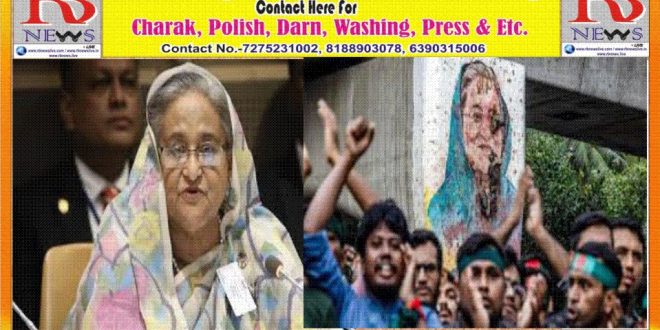Gunfire erupted in Dhaka, killing hundreds of students and injuring thousands. The government collapsed. Prime Minister Sheikh Hasina fled Bangladesh and took refuge in India. Sheikh Hasina, now living in India, has been sentenced to death on charges of crimes against humanity. The International Criminal Tribunal (ICT) in Dhaka has sentenced Sheikh Hasina. But the question now is: will India extradite her to Bangladesh? Does this sentence have any legal effect in India? Does the UN recognize this decision? And does Sheikh Hasina’s life now depend on India’s decision? Let’s understand the full story…
2024 Student Movement: The Fall of Power
The 2024 student movement, which began last year as a protest against the Bangladesh government’s reservation policy reforms, escalated into a nationwide uprising within just 48 hours. According to some reports, the movement resulted in the deaths of between 1,200 and 1,400 people, injuries to 20,000, the arrest of over 8,000 students, and a 23-day social media blackout.
International media described it as Bangladesh’s largest civilian uprising. Following the government’s repression, the military neutralized and Parliament was dissolved. Seeing the situation worsen, Sheikh Hasina fled the country and arrived in India in August 2024. Indian security agencies provided her with a negative security shield – meaning her whereabouts are kept confidential, but she receives government protection.
The ICT-1 Trial and the Death Sentence
In pronouncing the sentence on November 17, Bangladesh’s International Crimes Tribunal-1 (ICT-1) cited three counts:
Approving airstrikes on protesters
Ordering air-targeting operations in urban areas
Massive human rights violations
The court concluded: “State security forces were used in a war-like campaign, labeling the urban civilian population as enemies.”
The prosecution presented an alleged call recording in which Hasina is heard saying: “The cases filed against me give me license to kill. The ICT-1 has classified these as ‘crimes against humanity,’ and has awarded the death penalty.”
“This is a political ouster campaign, not justice.”
Sheikh Hasina has responded: “This is a political ouster campaign, not justice.” She has given this reaction after the death sentence was handed down against her, according to major reports and statements: Sheikh Hasina, who is currently living in India, has described the International Crimes Tribunal-1, established by Bangladesh’s interim administration, as “biased and politically motivated.”
She has described it as a “kangaroo court” and part of a “political campaign” to prevent her Awami League party from participating in national elections. Hasina has refused to recognize the case. This reaction reflects her and her party’s stance that the verdict is not based on justice but rather the result of political vendetta.
Is Bangladesh’s death penalty applicable in India?
The legal position in India is clear:
A sentence imposed by a foreign court is not enforceable in India unless it is reviewed and accepted by India’s own court.
This means: The ICT-1 death sentence has no effect on Sheikh Hasina, who is in India.
Can the UN enforce this sentence?
The ICT-1 is a domestic court. The UN can enforce the decisions of only two courts:
ICC – International Criminal Court
ICJ – International Court of Justice
ICT-1’s jurisdiction is not UN-enforced. Therefore, the UN cannot force India to hand over Sheikh Hasina.
Can India legally extradite?
India and Bangladesh have an Extradition Treaty in place. However, Indian law imposes three security filters on extradition, each with different conditions:
Extradition can be prevented if there is a risk of political retaliation.
Extradition can be completely blocked if a fair trial is denied.
If there is a risk of human rights violations or the death penalty, political asylum will be preferred.
India’s Extradition Act states: Death Penalty + Political Reasons = Extradition legally deniable. This means that India can prevent extradition on completely legal grounds if it wishes to do so.
What can Bangladesh do if India refuses?
In this situation, Bangladesh can exert diplomatic pressure.
It can complain to international organizations like SAARC/OIC/Commonwealth.
The issue can also be raised at the UNHRC.
But in this situation, India also has legal safeguards:
Human Rights Shield
Political Persecution Clause
Fair Trial Doctrine
Therefore, Bangladesh cannot legally compel India.
Impact of Sheikh Hasina’s extradition to Bangladesh
Growing anti-India sentiment in Bangladesh: Supporters and sympathizers of Hasina’s Awami League party could develop significant anger against India, straining bilateral relations.
Allegations of “India Regime Change”: The opposition and other groups could use this incident to claim that India directly interferes in the internal politics and regime changes of its neighboring countries. Security and Political Threat: Violent reactions from the Awami League could occur, and India would be accused of “extrading a former Prime Minister,” which could impact India’s image and security in the region.
Impact of Not Extraditing Sheikh Hasina
Impact on Border Commerce: The decision not to extradite Sheikh Hasina could impact trade, cross-border cooperation, and economic relations between the two countries, potentially slowing trade.
Reduced Security Cooperation: Bangladesh’s cooperation in national security and counter-terrorism operations could be affected.
Bangladesh’s tilt towards China: This is the biggest geopolitical risk. If India doesn’t cooperate, Bangladesh could move closer to China, which would be against India’s strategic interests and increase China’s influence in the region.
In short, this situation is a complex geopolitical conundrum, requiring India to balance its long-term strategy and security interests, regardless of its decision.
India’s Possible Path
According to Indian foreign strategy experts, there are three possible options:
Silent Asylum Model – Continue asylum, while remaining silent on extradition. Delay the process by stating the case is still under review.
Human Rights Shield Model – State clearly: Extradition is not possible because it involves the death penalty/political vendetta.
Conditional Extradition – India could say: “Extradition is possible only if the hanging is stopped and a fair international trial is held.”
All three approaches have one thing in common: Hasina’s life is tied to Delhi’s diplomatic strategy. Well, the world is governed by power, and the law bends to suit that power. The verdict has been given in Dhaka, but Sheikh Hasina’s life will now be decided not by the court, but by India’s foreign policy. Will India choose principle or relations with its neighbor? Will political asylum become a diplomatic firestorm? The next chapter is yet to be written.
 RB News World Latest News
RB News World Latest News






